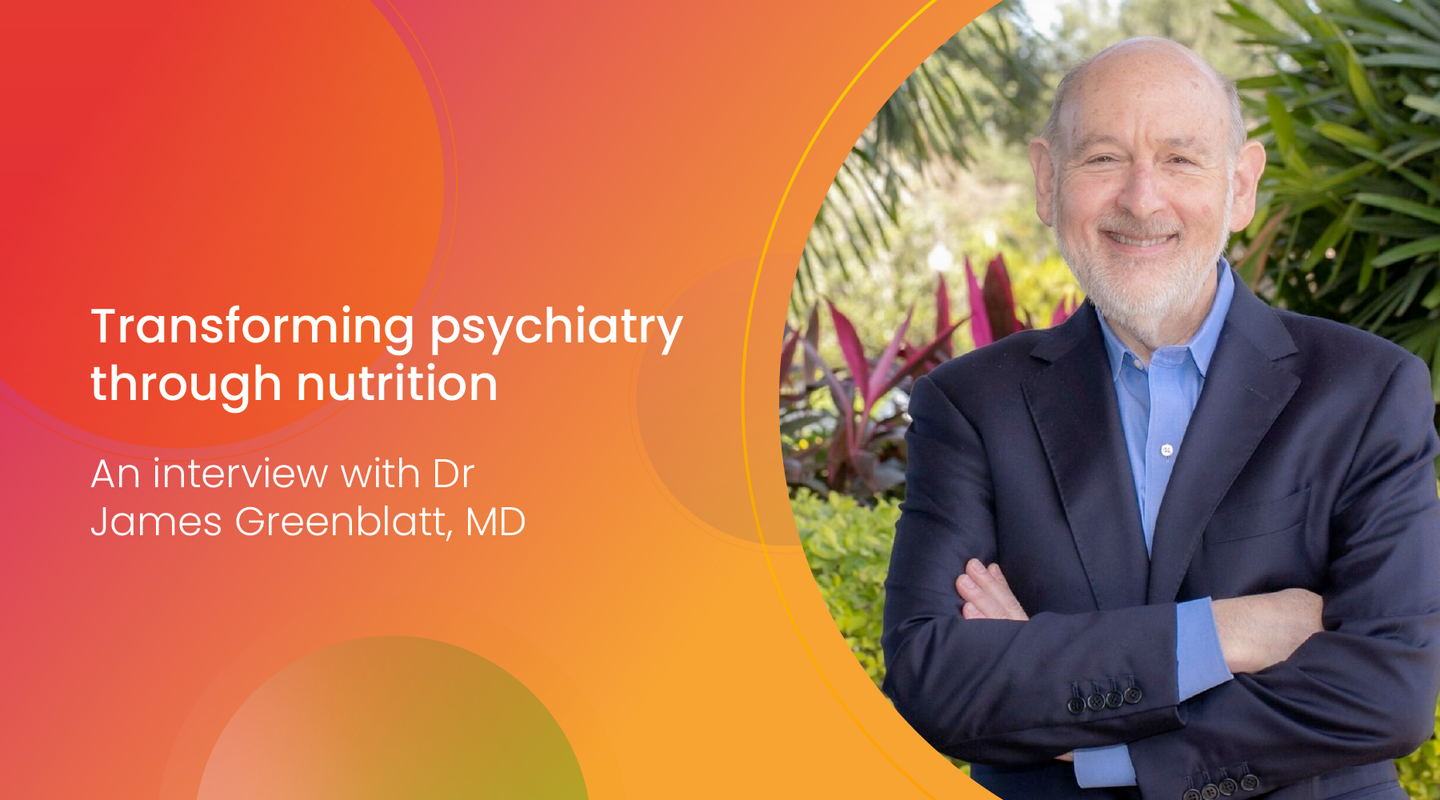Learn more about how Dr Greenblatt is transforming psychiatric care through nutrition, and how he plans to bring this to the UK this June.
As you may have seen through our recent communications, we're very excited to be co-hosting our upcoming conference - Redefining Nutritional Psychiatry: Breakthrough strategies in mental health - with Dr James Greenblatt and his Psychiatry Redefined team.
In light of this, we thought we would do a interview with Dr Greenblatt to learn more about his practice - and why he wanted to put on a dedicated nutritional psychiatry conference in the UK. Read on to learn more.
Watch the interview
Read the interview
How does your professional career make you a strong voice on nutritional psychiatry?
At medical school, I immersed myself in the traditional model of psychiatry and psychopharmacology. However, when practising as a child psychiatrist, I discovered that there were minimal medication tools - and that these tools weren't helping many of the children we were treating.
So almost 30 years ago now, I started looking at nutritional and metabolic interventions to support my patients struggling with anxiety, ADHD, and even childhood psychosis. And over the past 25 years, scientific literature has demonstrated the powerful connection between nutritional deficiencies and psychiatric and mental illness.
So the science is available; What is needed is to educate and equip clinicians with nutritional psychiatry tools to add to their current treatment model and better serve their patients. That's what my company, Psychiatry Redefined, and this conference is all about.
How and why is Psychiatry Redefined a game changing company for psychiatric patients and the psychiatric field?
Psychiatry Redefined is unique - it is one of only a few educational platforms that add to psychiatry's limited toolbox for treating mental illness.
Psychiatry's current treatment model is primarily the use of medications. To an extent, this is helpful, but the outcomes are poor. The relapse rate for mental illness is staggering, and the side effects of drugs often limit compliance.
So what we do at Psychiatry Redefined is not throwing away medication but offering new tools that clinicians can use to improve outcomes. We focus on functional medicine, which looks at health conditions' root causes. We look at nutritional deficiencies, hormonal imbalances, gut imbalances, environmental toxins, plus a host of metabolic and nutritional problems.
Too much of the excitement in changing this current model is focused on a new magic pill, psychedelic or neural modulating program. Psychiatry Redefined doesn't pick favourites. We educate clinicians on the most recent, available, and practical tools to enhance outcomes for our patients struggling with mental health issues, including depression, anxiety, and even psychosis.
Why do you feel that a conference on nutritional psychiatry is needed in the UK?
Much like the US, in the UK, the field of nutritional medicine is very limited to dietetic professionals - there is minimal training in nutritional medicine for psychiatrists and physicians.
Consequently, psychiatric patients are suffering. The brain is the most metabolically active organ, and nutritional deficiencies affect brain function. Therefore, it is vitally important that any clinical professional treating mental health must understand the relationship between nutrition and brain function.
Nutritional psychiatry provides simple, reliable and effective solutions for patients, particularly those that have failed traditional psychiatric treatment.
What will attendees gain from attending this conference?
From this conference, attendees will gain an appreciation for every psychiatric patient's unique biochemistry - and in light of this, instead of using a one-size-fits-all medication approach, they will switch to personalised treatment plans.
What part of your lectures at the conference are you most excited to deliver?
I am particularly excited to share incredibly new findings on the role of low-dose lithium as a preventative treatment for dementia and Alzheimer's. This information is both exciting and, more importantly, simple and safe.
What aspect of the conference are you most excited about?
I'm excited that we're exposing the UK clinical community to the power of a functional medicine approach to psychiatry and providing them with a whole new toolbox to work with to better their patient's treatment.
Why are you excited to partner with Regenerus Labs to deliver this conference?
I'm excited to partner with Regenerus Labs because they share our belief that better treatment is needed for those struggling with mental illness.
As a leading functional lab testing distributor, Regenerus Labs are a suitable co-host. Their vast selection of lab tests allows clinical professionals to assess a patient's nutrient levels, gut bacteria, metabolites, and genetic vulnerabilities; the list is endless to give an objective picture of a patient's health. What's exciting is that we can use this data to deliver personalised treatments and, consequently, better outcomes for patients struggling with mental illness.
Regenerus Labs is a perfect partner. With its high levels of customer care, support and professionalism, they will deliver this model in the UK as we build a global community of clinicians searching for better treatment models. Having objective testing to support our treatment decisions will dramatically improve outcomes and help build a community of colleagues sharing information.
Why do you think functional testing is important to treat mental health today?
Oddly, psychiatry is one of the few medical specialities where few examine the brain - and within this, it is currently mainly limited to genetics and genetic testing. However, the world of functional medicine offers a new horizon. Genetics are important, but understanding and treating nutritional deficiencies, environmental toxins, hormones, and gut bacteria can dramatically better outcomes for mental health.
The future of psychiatry is precision medicine. The science is available - we have to get this information to clinicians. Our patients deserve better.
Join us this June!
See James lecture at our upcoming conference, Redefining Nutritional Psychiatry: Breakthrough Strategies for Mental Health this June in London or online.
To see the speaker line up, schedule, and conference offers, click here.



